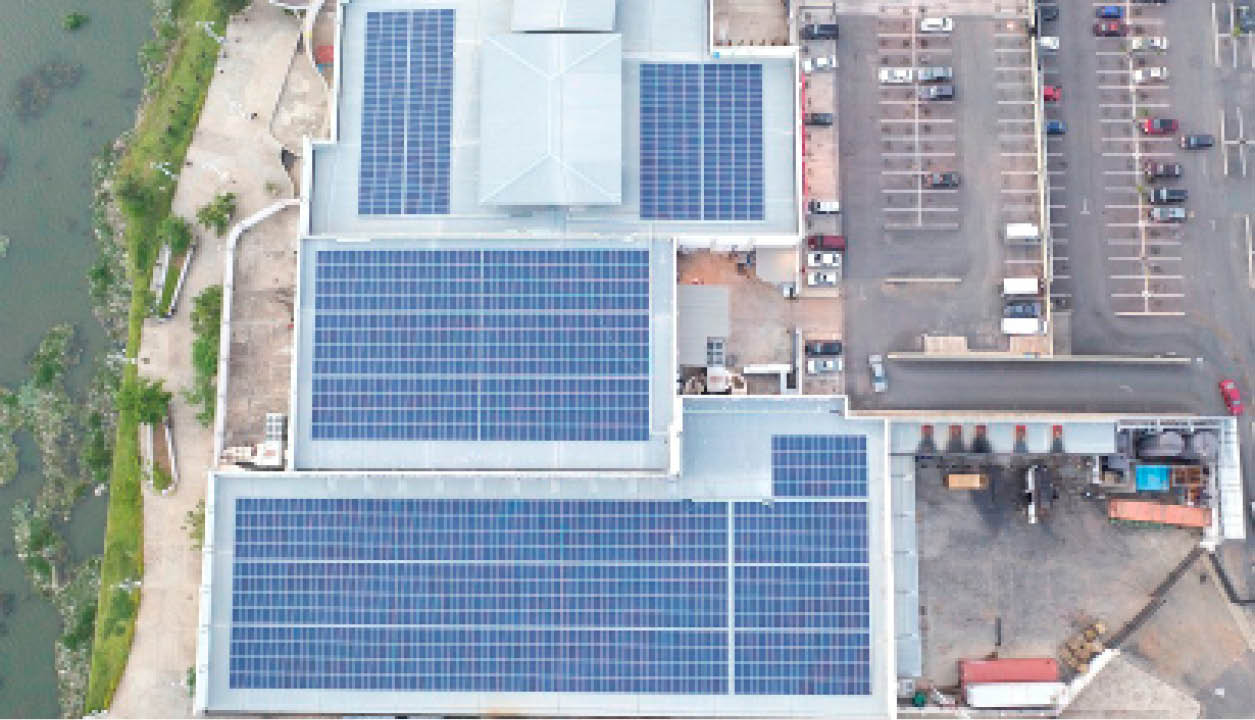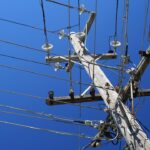The rising cost of electricity in doing business is a major thorn in the flesh of budding entrepreneurs and even already established large scale firms in third world countries.
The trend is gradually changing as Actis UK, along with CrossBoundary Energy (CBE) built a 609 kilowatts peak (kWp) Solar Hybrid power at the Jabi Lake Mall in Abuja last year.
The project said to be first of a kind renewable energy for a Nigerian mall has cut down the mall’s reliance on polluting diesel generators thereby reducing carbon emissions by over 13,000 tonnes in line with the Paris agreement on the Sustainable Development Goals (SDG).
In this piece, our reporter examines the clean energy project, a demonstration of private sector investments in renewable energy in Nigeria.
According to an outlook statistics by the Manufacturers Association of Nigeria (MAN) in March, the cost of electricity accounts for 40 percent of their production cost, which also accounts for the increase in the price of goods and services.
Despite this high cost of electricity, more business firms are daily complaining of the epileptic power supply and the quality of electricity when it is available.
According to Mr Joe Onuoha, a water and beverage producer in Abuja, he would always turn on his diesel-powered generator, away from grid electricity during production to avoid breaking the chain in the event of grid power interruption.
However, 106 Micro, Small and Medium-scale Enterprises (MSMEs) owners have seen their electricity bills drop by 30 percent at the Jabi Lake Mall in Abuja.
This was after its manager – Actis UK commissioned a 609 kilowatts peak (kWp) solar hybrid power plant that drastically cut down the reliance on diesel generators and to reduce carbon emissions in line with the COP26 Energy Transition Campaign.

The Minister of State for Power, Mr Goddy Jedy-Agba on Monday, April 19, 2021 inspected the Jabi Lake Mall solar hybrid power plant that has powered the facility for 14 months.
Commenting on this innovation of Actis, a United Kingdom managed firm, the minister called on investors to urgently replicate this to drive down the energy cost for MSMEs. “Actis is proving that one can cut down energy bills through this project and this should be replicated in other places,” said Jedy-Agba.
Beyond running independent off-grid solar mini-grid, the minister advised investors to consider the hybrid model like the Jabi Lake Mall where they can partner with the Distribution Companies (DisCos) who have the franchise to integrate solar energy into grid power supply for commercial and industrial facilities.
“The solar hybrid project at Jabi Lake Mall is another example of Nigeria’s pioneering role in clean energy transition.”
The project has also caught the attention of the United Nations Special Representative of Secretary-General for Sustainable Energy for All, Ms Damilola Ogunbiyi, as she said the project showcases large-scale sustainable solar energy projects in Nigeria that could help to improve the operations of SMEs.
Ogunbiyi who is also the CEO of Sustainable Energy for All said this will be through the provision of world class clean energy projects in Nigeria in line with the Paris Agreement and UKCOP26 Energy Transition Campaign (ETC).
Actis Principal, Mr Tolu Sokenu, who explained the plant’s component, said the mall hosts 106 brands that include Shoprite, Game, and Silverbird. These businesses are powered in a hybrid arrangement with 1,848 solar photovoltaic (PV) panels generating 850 megawatts hour (MWh) of electricity annually.
He said while this will reduce carbon emissions by 13,000 tonnes, it has also cut down the energy bill of the SMEs owners in the mall by 25 to 30 percent.
The Deputy High Commission, United Kingdom Ben Llewellyn-Jones, said Nigeria is a prominent member of the COP26 Energy Transition Council, which seeks to accelerate the transition to clean power.
The Country Director, World Bank, Shubhan Chaudhuri, urged the replication of the project across similar commercial establishments in Nigeria.
We’ve uninterrupted supply – Customers
Some staff of the various shops in the mall said there is always constant power supply in the facility, boosted with the solar power plant.
Some further confirmed that their electricity bills dropped. An operations staff at Office Everything, a supply shop in the mall, confirmed the bills have somewhat reduced.
“We have constant power supply and we do not have to worry about what we pay as it has dropped, and we learnt the facility managers are being innovative with solar power to improve electricity and further cut the bills,” said Olawole James.
At Domino’s Pizza at the ground floor of the mall which is operated by Eat’N’Go Limited, the master franchisor, the attendants said, they have power supply continuously.
An attendant who gave her name simply as Mercy, said: “I have been working here and I can tell that we have power always with more guarantee since the mall owners installed the solar power supply option.”
After an enquiry on the energy payment process, Actis Principal, Mr Sokenu, clarified that the solar plant has not totally cut the power bills of the store operators in the mall.
“The power from both the diesel generator, grid electricity and the solar are harmonised and so customers get a single bill from the facility management, and that has reduced significantly,” Sokenu explained.
The Jabi Lake Mall plant is said to be a demonstration of what MSEs can do when they collaborate to tackle the persistent inadequate power supply in Nigeria.
Nigeria produces an average of 4,000 megawatts (MW) of electricity daily, however small businesses are still left to wallow in outages across several states as there is no deliberate action by the Distribution Companies (DisCos) to boost their power supply expectations.
SMEs are also battling multiple taxation along with high electricity tariff and would be better if they have alternatives for improved supply, said Kunle Olubiyo, President, Nigerian Consumer Protection Network (NCPN) in Abuja.
“This is why we have called on the government not to increase electricity tariff as they plan to review the tariff,” he noted.
A survey by Daily Trust recently indicates that business owners are frustrated in Lagos, Kano and other major cities due to poor electricity supply.
A bakery manager at Ogba Lagos, Miss Gbemi, said the owner of the bakery she managed recently decided to close shop because of the high cost of production.
“Our bills continued to pile up and we were owing over N300,000 before the Ikeja Electric came to disconnect our light. For over six months, we were running a generator for production and running of the office. It was really not easy.”
A visit to Dakata Small and Medium scale Enterprises (SMEs) hub in Kano State revealed that the business activities around many cottage factories have died down.
The Manager of Ice Table Water and General Enterprises, Mr Lucky Okon, said the rise in electricity tariff since last year accounted for the heavy glut.
He added that initially his factory with over 75 employees spent N250,000 to N300,000 per month on electricity and that now the factory is spending N750,000 per month just on electricity.
To improve this situation, Abuja Electricity Distribution Company (AEDC) in 2019 announced that it secured from the United States Trade Department Administration (USTDA), about $1.06m to expand its networks and integrate solar power mini grid.
According to the Managing Director, Dr Ernest Mupwaya, the DisCo will be deploying 1,370 solar-powered mini grids to communities and business clusters to boost power supply.
To test run the initiative, AEDC in October 2019, signed a pact with Green Village Energy (GVE) to build a 1MW capacity mini grid facility to power Wuse market in Abuja within its franchise distribution network. However, after the COVID-19 pandemic set in, the project was yet to materialise.

 Join Daily Trust WhatsApp Community For Quick Access To News and Happenings Around You.
Join Daily Trust WhatsApp Community For Quick Access To News and Happenings Around You.
